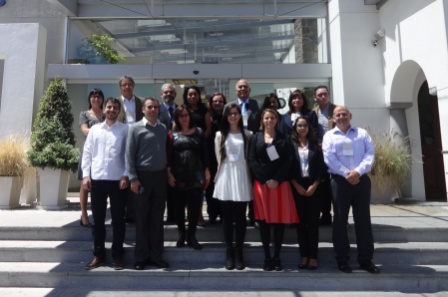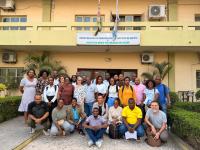UNASUR structuring networks discuss public health education in the region

UNASUR’s Public Health Schools Network (RESP) held a workshop on October 6-8 in Ecuador to discuss and develop quality criteria and minimum common curricula in public health for mid-level (technical) and undergraduate level in South America. The meeting included representatives from ten countries of UNASUR (Brazil, Chile, Colombia, Ecuador, Guyana, Paraguay, Peru, Suriname, Uruguay and Venezuela), as well as members of the South American Institute of Government in Health (ISAGS), the Center for International Relations in Health (CRIS/Fiocruz) and UNASUR Health Technical Schools Network (RETS-UNASUR), one of the two subnetworks of the International Network of Health Technicians Education (RETS).
In the first two days of the meeting, RESP representatives presented the current situation of public health education in their countries. In addition, a successful experience of Chile was shown.
Director of the National School of Public Health of the Chilean college Oscar Arteaga talked about his country’s experience in this topic and presented the project of the National Network of Public Health Education Institutions, which is being implemented by the nation since 2011. “We defined that graduates should be able to assess the health needs of the population of origin of their patients and develop their professional practice proactively, working with the existing health system. Thus, patients will be treated as part of the community to which they are integrated”, he said. Currently, the country is the only state in the region with an established national network.
Arteaga also explained that, through the school system, it was possible to define common points of the proposed minimum curricula, which include all public health university courses, as well as an official document for health as a fundamental human right. He said the next step is to submit the minimum curricula proposal to the Association of Chilean medical schools.
On October 8, in RESP/UNASUR’s third meeting, Network’s executive secretariat member Federico Perez gave an overview of the panorama of public health education in South America from a survey of countries and discussed the Network’s work plan for the coming years.
RETS’ participation aimed at exchanging information regarding health technical education, highlighting important elements for public health: knowledge of the health system and interculturality, understanding of social determinants of health, public reception, among others.
One of RETS-UNASUR representatives at the event, namely, Helifrancis Condé, said the meeting was very fruitful. “RESP’s work dynamics, the possibility of learning other realities within the public health-targeted technical education and the realization of shared concerns and agendas of the two networks, which point to future joint actions. These were just some of the positive points of the meeting I would like to highlight. The experience has shown that joint work between UNASUR’s structuring networks is possible and necessary”, he said.
RESP/UNASUR
UNASUR’s Network of Public Health Schools (RESP/UNASUR) was established in 2011 by the South American Health Council, with the main objective of promoting technical cooperation and exchange of experiences between Public Health Schools, Training Centers and Government Levels of UNASUR member countries, aiming at strengthening local and regional capacities for training and continuing education of public health professionals, thus contributing to the improvement of health programs, policies and systems in the South American region. RESP/UNASUR is composed by representatives from each member country of UNASUR.



